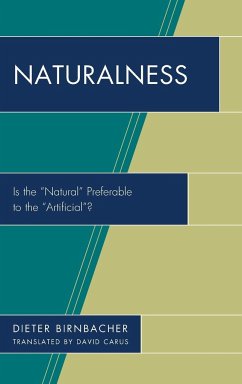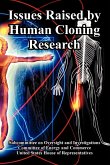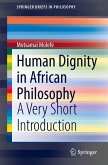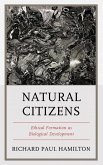- Gebundenes Buch
- Merkliste
- Auf die Merkliste
- Bewerten Bewerten
- Teilen
- Produkt teilen
- Produkterinnerung
- Produkterinnerung
Naturalness delves into a long withstanding argument of everyday life-the argument of naturalness. This book questions why what is natural has been seen in some ways as superior to what is artificial and discusses the role and validity of naturalistic arguments in domains such as politics, ethics, and reasoning.
Andere Kunden interessierten sich auch für
![Philosophy and Theory of Artificial Intelligence 2021 Philosophy and Theory of Artificial Intelligence 2021]() Philosophy and Theory of Artificial Intelligence 2021119,99 €
Philosophy and Theory of Artificial Intelligence 2021119,99 €![Human Dignity and World Order Human Dignity and World Order]() Glen T. MartinHuman Dignity and World Order38,99 €
Glen T. MartinHuman Dignity and World Order38,99 €![Emotions and Risky Technologies Emotions and Risky Technologies]() Emotions and Risky Technologies75,99 €
Emotions and Risky Technologies75,99 €![Human Dignity, Human Rights, and Social Justice Human Dignity, Human Rights, and Social Justice]() Human Dignity, Human Rights, and Social Justice97,99 €
Human Dignity, Human Rights, and Social Justice97,99 €![Issues Raised by Human Cloning Research Issues Raised by Human Cloning Research]() United States House of RepresentativesIssues Raised by Human Cloning Research20,99 €
United States House of RepresentativesIssues Raised by Human Cloning Research20,99 €![Human Dignity in African Philosophy Human Dignity in African Philosophy]() Motsamai MolefeHuman Dignity in African Philosophy49,99 €
Motsamai MolefeHuman Dignity in African Philosophy49,99 €![Natural Citizens Natural Citizens]() Richard Paul HamiltonNatural Citizens108,99 €
Richard Paul HamiltonNatural Citizens108,99 €-
-
-
Naturalness delves into a long withstanding argument of everyday life-the argument of naturalness. This book questions why what is natural has been seen in some ways as superior to what is artificial and discusses the role and validity of naturalistic arguments in domains such as politics, ethics, and reasoning.
Hinweis: Dieser Artikel kann nur an eine deutsche Lieferadresse ausgeliefert werden.
Hinweis: Dieser Artikel kann nur an eine deutsche Lieferadresse ausgeliefert werden.
Produktdetails
- Produktdetails
- Verlag: Globe Pequot Publishing Group Inc/Bloomsbury
- Seitenzahl: 188
- Erscheinungstermin: 15. April 2014
- Englisch
- Abmessung: 235mm x 157mm x 15mm
- Gewicht: 431g
- ISBN-13: 9780761863496
- ISBN-10: 0761863494
- Artikelnr.: 40455536
- Herstellerkennzeichnung
- Libri GmbH
- Europaallee 1
- 36244 Bad Hersfeld
- gpsr@libri.de
- Verlag: Globe Pequot Publishing Group Inc/Bloomsbury
- Seitenzahl: 188
- Erscheinungstermin: 15. April 2014
- Englisch
- Abmessung: 235mm x 157mm x 15mm
- Gewicht: 431g
- ISBN-13: 9780761863496
- ISBN-10: 0761863494
- Artikelnr.: 40455536
- Herstellerkennzeichnung
- Libri GmbH
- Europaallee 1
- 36244 Bad Hersfeld
- gpsr@libri.de
By Dieter Birnbacher - Translated by David Carus
Preface 1. Natural and Artificial: Introductory Distinctions 1.1
Naturalness and Artificiality as Points of Orientation 1.2 Genetic and
Qualitative Naturalness 1.3 Dimensions of Naturalness in a Genetic Sense
1.4 Dimensions of Naturalness in a Qualitative Sense 2. Naturalness as a
Value 2.1 Has Naturalness become Discredited as a Normative Principle? 2.2
The Naturalness Bonus in Everyday Morality 2.3 Naturalness Arguments in
Applied Ethics 2.4 "Natural": Positive Connotations and their Background
2.5 The Structure of Naturalness Arguments 2.6 The Task of the Following
Chapters 3. Naturalness as a Norm 3.1 Nature as a Basis for Moral Norms?
3.2 Is the Argument of "Naturalistic Fallacy" valid? 3.3 Different
Approaches to Criticizing Ethical Naturalism 3.4 The Projective Character
of Normative Images of Nature 3.5 Learning from Nature 3.6 Conclusions 4.
Naturalness in the Ethics of Nature: What Type of Nature is Worth
Protecting? 4.1 Naturalness and other Values of Nature 4.2 Can the Value of
Protection be Applied to its Necessary Conditions? 4.3 Nature as an
Anti-World 4.4 The Conservation of Naturalness in the Genetic Sense:
Originality 4.5 Faking Nature 4.6 Naturalness in a Qualitative Sense-an
Aesthetic or also an Ethical Principle? 4.7 Does the Recognition of the
Value of Naturalness Demand a Non-Anthropocentric Ethic? 4.8 Conclusions 5.
To What Extent should we be Allowed to Alter our Individual Natural
Contingency? 5.1 The Religious and other Reasons for the Sacrosanctity of
Given Nature 5.2 Natural and Artificial: Boundary Issues 5.3 Which
Alterations resulting from Intervention are Ethically Problematic? 5.4
Naturalness in Dealing with Ourselves-An Independent Value? 5.5 The
"Naturalization" of Human Dignity 5.6 Conclusions 6. Naturalness Arguments
in Reproductive Medicine 6.1 Gradations of Artificiality 6.2 What Role do
Naturalness Arguments Play in Reproductive Medicine? 6.3 Naturalness
Preferences versus Naturalness Principles 6.4 Sex Selection as a Test Case
of Biopolitics 6.5 Principles of Naturalness in the Debate on Reproductive
Cloning 6.6 The Dignity of the Species and Naturalness 6.7 Conclusions 7.
Naturalness as a Boundary to Transforming Human Nature 7.1 The Idea of a
Species Ethics 7.2 What does "Human Nature" mean? 7.3 "Posthumanism"? 7.4
The Openness of Human Nature 7.5 Images of Humanity as Intrinsic Values?
7.6 Conclusions Bibliography Index of Names
Naturalness and Artificiality as Points of Orientation 1.2 Genetic and
Qualitative Naturalness 1.3 Dimensions of Naturalness in a Genetic Sense
1.4 Dimensions of Naturalness in a Qualitative Sense 2. Naturalness as a
Value 2.1 Has Naturalness become Discredited as a Normative Principle? 2.2
The Naturalness Bonus in Everyday Morality 2.3 Naturalness Arguments in
Applied Ethics 2.4 "Natural": Positive Connotations and their Background
2.5 The Structure of Naturalness Arguments 2.6 The Task of the Following
Chapters 3. Naturalness as a Norm 3.1 Nature as a Basis for Moral Norms?
3.2 Is the Argument of "Naturalistic Fallacy" valid? 3.3 Different
Approaches to Criticizing Ethical Naturalism 3.4 The Projective Character
of Normative Images of Nature 3.5 Learning from Nature 3.6 Conclusions 4.
Naturalness in the Ethics of Nature: What Type of Nature is Worth
Protecting? 4.1 Naturalness and other Values of Nature 4.2 Can the Value of
Protection be Applied to its Necessary Conditions? 4.3 Nature as an
Anti-World 4.4 The Conservation of Naturalness in the Genetic Sense:
Originality 4.5 Faking Nature 4.6 Naturalness in a Qualitative Sense-an
Aesthetic or also an Ethical Principle? 4.7 Does the Recognition of the
Value of Naturalness Demand a Non-Anthropocentric Ethic? 4.8 Conclusions 5.
To What Extent should we be Allowed to Alter our Individual Natural
Contingency? 5.1 The Religious and other Reasons for the Sacrosanctity of
Given Nature 5.2 Natural and Artificial: Boundary Issues 5.3 Which
Alterations resulting from Intervention are Ethically Problematic? 5.4
Naturalness in Dealing with Ourselves-An Independent Value? 5.5 The
"Naturalization" of Human Dignity 5.6 Conclusions 6. Naturalness Arguments
in Reproductive Medicine 6.1 Gradations of Artificiality 6.2 What Role do
Naturalness Arguments Play in Reproductive Medicine? 6.3 Naturalness
Preferences versus Naturalness Principles 6.4 Sex Selection as a Test Case
of Biopolitics 6.5 Principles of Naturalness in the Debate on Reproductive
Cloning 6.6 The Dignity of the Species and Naturalness 6.7 Conclusions 7.
Naturalness as a Boundary to Transforming Human Nature 7.1 The Idea of a
Species Ethics 7.2 What does "Human Nature" mean? 7.3 "Posthumanism"? 7.4
The Openness of Human Nature 7.5 Images of Humanity as Intrinsic Values?
7.6 Conclusions Bibliography Index of Names
Preface 1. Natural and Artificial: Introductory Distinctions 1.1
Naturalness and Artificiality as Points of Orientation 1.2 Genetic and
Qualitative Naturalness 1.3 Dimensions of Naturalness in a Genetic Sense
1.4 Dimensions of Naturalness in a Qualitative Sense 2. Naturalness as a
Value 2.1 Has Naturalness become Discredited as a Normative Principle? 2.2
The Naturalness Bonus in Everyday Morality 2.3 Naturalness Arguments in
Applied Ethics 2.4 "Natural": Positive Connotations and their Background
2.5 The Structure of Naturalness Arguments 2.6 The Task of the Following
Chapters 3. Naturalness as a Norm 3.1 Nature as a Basis for Moral Norms?
3.2 Is the Argument of "Naturalistic Fallacy" valid? 3.3 Different
Approaches to Criticizing Ethical Naturalism 3.4 The Projective Character
of Normative Images of Nature 3.5 Learning from Nature 3.6 Conclusions 4.
Naturalness in the Ethics of Nature: What Type of Nature is Worth
Protecting? 4.1 Naturalness and other Values of Nature 4.2 Can the Value of
Protection be Applied to its Necessary Conditions? 4.3 Nature as an
Anti-World 4.4 The Conservation of Naturalness in the Genetic Sense:
Originality 4.5 Faking Nature 4.6 Naturalness in a Qualitative Sense-an
Aesthetic or also an Ethical Principle? 4.7 Does the Recognition of the
Value of Naturalness Demand a Non-Anthropocentric Ethic? 4.8 Conclusions 5.
To What Extent should we be Allowed to Alter our Individual Natural
Contingency? 5.1 The Religious and other Reasons for the Sacrosanctity of
Given Nature 5.2 Natural and Artificial: Boundary Issues 5.3 Which
Alterations resulting from Intervention are Ethically Problematic? 5.4
Naturalness in Dealing with Ourselves-An Independent Value? 5.5 The
"Naturalization" of Human Dignity 5.6 Conclusions 6. Naturalness Arguments
in Reproductive Medicine 6.1 Gradations of Artificiality 6.2 What Role do
Naturalness Arguments Play in Reproductive Medicine? 6.3 Naturalness
Preferences versus Naturalness Principles 6.4 Sex Selection as a Test Case
of Biopolitics 6.5 Principles of Naturalness in the Debate on Reproductive
Cloning 6.6 The Dignity of the Species and Naturalness 6.7 Conclusions 7.
Naturalness as a Boundary to Transforming Human Nature 7.1 The Idea of a
Species Ethics 7.2 What does "Human Nature" mean? 7.3 "Posthumanism"? 7.4
The Openness of Human Nature 7.5 Images of Humanity as Intrinsic Values?
7.6 Conclusions Bibliography Index of Names
Naturalness and Artificiality as Points of Orientation 1.2 Genetic and
Qualitative Naturalness 1.3 Dimensions of Naturalness in a Genetic Sense
1.4 Dimensions of Naturalness in a Qualitative Sense 2. Naturalness as a
Value 2.1 Has Naturalness become Discredited as a Normative Principle? 2.2
The Naturalness Bonus in Everyday Morality 2.3 Naturalness Arguments in
Applied Ethics 2.4 "Natural": Positive Connotations and their Background
2.5 The Structure of Naturalness Arguments 2.6 The Task of the Following
Chapters 3. Naturalness as a Norm 3.1 Nature as a Basis for Moral Norms?
3.2 Is the Argument of "Naturalistic Fallacy" valid? 3.3 Different
Approaches to Criticizing Ethical Naturalism 3.4 The Projective Character
of Normative Images of Nature 3.5 Learning from Nature 3.6 Conclusions 4.
Naturalness in the Ethics of Nature: What Type of Nature is Worth
Protecting? 4.1 Naturalness and other Values of Nature 4.2 Can the Value of
Protection be Applied to its Necessary Conditions? 4.3 Nature as an
Anti-World 4.4 The Conservation of Naturalness in the Genetic Sense:
Originality 4.5 Faking Nature 4.6 Naturalness in a Qualitative Sense-an
Aesthetic or also an Ethical Principle? 4.7 Does the Recognition of the
Value of Naturalness Demand a Non-Anthropocentric Ethic? 4.8 Conclusions 5.
To What Extent should we be Allowed to Alter our Individual Natural
Contingency? 5.1 The Religious and other Reasons for the Sacrosanctity of
Given Nature 5.2 Natural and Artificial: Boundary Issues 5.3 Which
Alterations resulting from Intervention are Ethically Problematic? 5.4
Naturalness in Dealing with Ourselves-An Independent Value? 5.5 The
"Naturalization" of Human Dignity 5.6 Conclusions 6. Naturalness Arguments
in Reproductive Medicine 6.1 Gradations of Artificiality 6.2 What Role do
Naturalness Arguments Play in Reproductive Medicine? 6.3 Naturalness
Preferences versus Naturalness Principles 6.4 Sex Selection as a Test Case
of Biopolitics 6.5 Principles of Naturalness in the Debate on Reproductive
Cloning 6.6 The Dignity of the Species and Naturalness 6.7 Conclusions 7.
Naturalness as a Boundary to Transforming Human Nature 7.1 The Idea of a
Species Ethics 7.2 What does "Human Nature" mean? 7.3 "Posthumanism"? 7.4
The Openness of Human Nature 7.5 Images of Humanity as Intrinsic Values?
7.6 Conclusions Bibliography Index of Names









